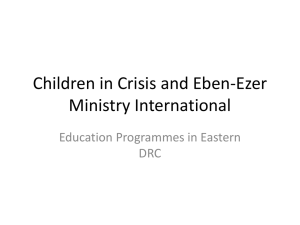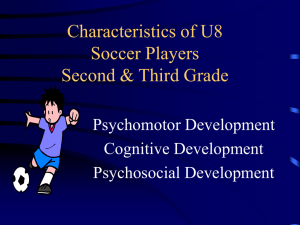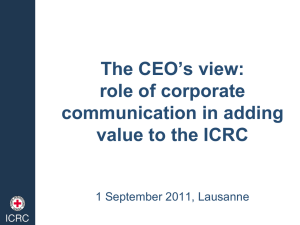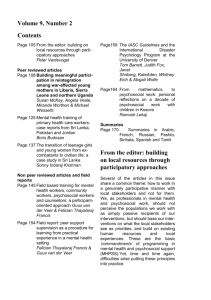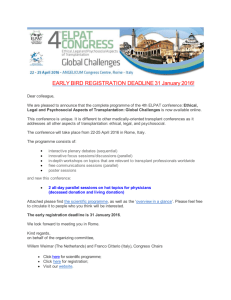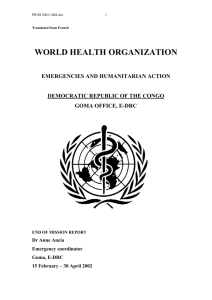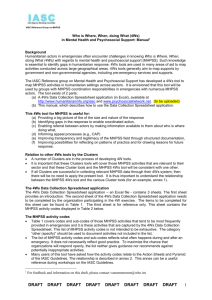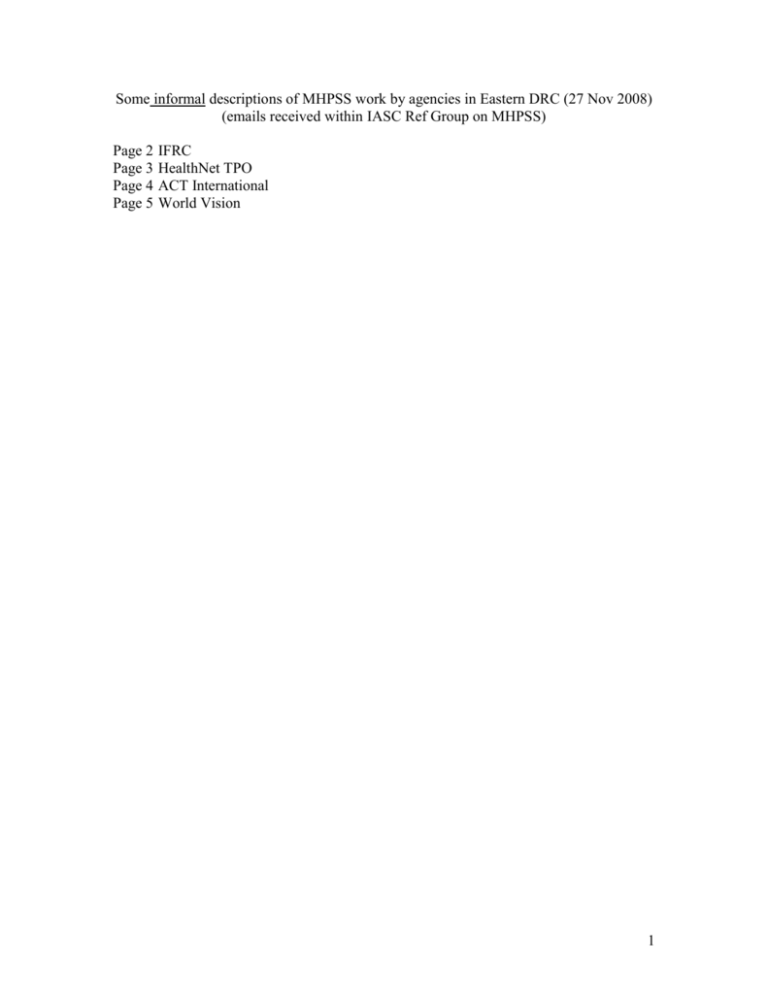
Some informal descriptions of MHPSS work by agencies in Eastern DRC (27 Nov 2008)
(emails received within IASC Ref Group on MHPSS)
Page 2
Page 3
Page 4
Page 5
IFRC
HealthNet TPO
ACT International
World Vision
1
IFRC
Please fint below an update on recent action by the Red Cross in Congo/DRC. Due to the nature
of the emergency, (armed conflict) it is the International Committee of the Red Cross (ICRC) who
has the lead for all international RC action. The International Federation of the Red Cross and
Red Crescent Societies (IFRC, which the Reference Centre for Psychosocial Support is part of) is
in contact with our colleagues in ICRC and relevant activities are implemented in collaboration
with Congolese Red Cross (CRRDC).
In relation to psychosocial support and the North/South Kivu conflict, ICRC specifically focuses on
sexual violence committed against women. In addition to conducting its traditional activities aimed
at protecting people from serious abuses such as massacres, looting, killings and rape, the ICRC
runs programmes specifically designed to provide comprehensive assistance for the victims of
sexual violence. Multidisciplinary teams offer medical care, facilitate psychosocial reintegration
and implement community-based prevention campaigns. More information on this below.
[snip]
Summary of activities:
Necessities are distributed to displaced people residing in camps in Saké and
Bweremana (25 km west of Goma), Kibati (15 km north-east of Goma) and Goma itself.
Activities include emergency food distributions, supply of safe drinking water and
emergency medical services. In Kibati ICRC supports two counselling centres in the
camps, in close cooperation with the CRRDC. These facilities assist and counsel victims
of sexual violence.
In Béni - Butembo - Kirumba (150 km north of Goma) Following fighting in the town of
Kirumba, CRRDC volunteers have been collecting and facilitating the identification of
bodies, disinfecting and, where conditions allow, notifying relatives.
As per its humanitarian mandate, the ICRC and the CRRDC have begun efforts to trace
the relatives of children separated from their families during the fighting. Local radio
stations are playing an important role in these efforts. The ICRC has continued its
protection and relief activities for the inmates of Goma prison. Messages containing
family news have been distributed between family members made otherwise unreachable
by the conflict.
The ICRC continues to record the testimony of victims of abuses committed by weapon
bearers in order to make bilateral and confidential representations to the various entities
on the ground in North and South Kivu.
In North Kivu and Minova, the ICRC continues to support 18 shelters for victims of sexual
violence (maisons d'écoute), to which increasing numbers of women are turning for help.
If necessary, the victims are directed to health-care facilities for appropriate medical
treatment.
The maisons d'écoute are shelters for victims of sexual violence. They are run by
volunteers from local associations and provide a place where people can come and talk
in private, far from prying eyes, about what happened to them. They also provide housing
for as long as necessary – sometimes weeks or even months – for young girls and
women who have been rejected by their families or husbands following a rape. At the
shelters, women are provided general and medical care and their basic needs are met.
Shelter activities are complemented by awareness raising campaigns within affected
communities. In the longer run, women are supported economically, through participation
in micro-finance programmes set-up by local Congolese organisations.
2
HealthNet TPO
At the moment HealthNet TPO is not active in the refugee crisis, but we have a general health
programme in Butembo (200 km north of Goma) in which mental health is a component. We have
an active network in Kinshasa (University and Mental Health Unit of Ministry of Health). We are
trying to push the integration of mental health into general health care in DRC, and could
discuss ways in which we can support the MHPSS response for the IDPs by capacity building of
other NGOs.
We have MHPSS projects in the Great Lake Area, mainly Burundi and Rwanda.
3
ACT International
Dear All,
I and a colleague are prepared to attend this teleconference to share planned and ongoing
activities of ACT Alliance in this area.
As it might be quite complicated to have a teleconference with so many participants, I suggest
that those of us that are engaged in any kind of psychosocial support write a short summary of
planned and ongoing activities in the area.
This is a short summary of the psychosocial components of the latest ACT Appeal for DRC:
DRC ACT members plan to assist 11,750 IDPs, returnees and host family households,
approximately 58,750 people in North and South Kivu. The ACT Forum members have
prioritised agricultural support, nutrition, psychosocial support, and water and sanitation
as main sector activity.
ACT Implementing partners: Lutheran World Federation (LWF), Bureau Oecumenique
d’Appui au Développemement (BOAD), ECC South Kivu Province (a provincial federation
including 20 church communities in South Kivu), ECC North Kivu, Evangelical Lutheran
Church in Congo (EELCO), Norwegian Church Aid (NCA), EPER/HEKS.
4 ACT Assessment teams sent to Rutshuru, Kanyabanonga and Goma in North Kivu and
Minova in South Kivu.
Coordination: ACT Forum members meet regularly to plan and monitor the activities.
ACT Forum members seek cooperation with other agencies on the ground in the interest
of avoiding duplication and ensuring transparency. They attend the UNOCHA-chaired
coordination meetings in the different provinces.
Psychosocial support and trauma healing is planned to reach 9,000 IDPs and returnees
affected by the ongoing armed conflict in Goma, Rushturu and Nyanzale. It will consist of:
o Addressing the general psychosocial distress among IDPs and returnees through
local partner organisations experienced in psychosocial support activities (while
severe cases will require professional care),
o “Listening points” at water fetching stations
o Family mediation and community based psychosocial support
o Recreation activities for children and youth
o Capacity building support to the partner organisations implementing psychosocial
support
Church of Sweden (CoS) is planning to deploy a psychosocial consultant for six months
from January.
Indicators
o 16 listening points set up around the water tapping stations.
o 4 local NGOs received training in the running of listening points.
o 20 water and sanitation committees received training in organized SGBV
preventive measures.
o 16 women activity groups set up in and around the IDP camps.
[snip]
4
World Vision
World Vision is working with the main coordination group, OCHA, as well
as some of the smaller cluster working groups, including education,
protection and food security. World Vision's response includes a focus
on Basic Needs, Education & Protection.
The following are some of our key activities outlined in our initial
90-day response plan.
Re: Basic Needs. WV is providing cash transfers for people seeking
health/medical support. This also reinforces health systems. WV is
also providing for 3 x vehicles for 3 x hospitals in the regions. Food
aid and NFI is being distributed through churches and schools where
people have sought shelter. We are presently negotiating with WFP on
possible food distribution options.
Re: Education. WV is rehabilitating and/or constructing 8 secondary
schools (noting that primary schools are being focused on by UNICEF)
Re: Protection. WV is establishing protection committees amongst IDP
groups, setting up Child Friendly Spaces and working with ICRC on
reunification of separated/unaccompanied children. Advocacy is being
undertaken for the release of children in armed groups. Referral
pathways for women who have experienced SGBV is being encouraged along
with advocacy to local groups for improved services for these affected
women's groups. Training in protection, IHL and rights is being
undertaken with security personnel, armed groups and community leaders,
as well as training for local staff on mainstreaming protection
principles across all sectors. WV is also attempting to be active in
providing current information to returnees on services and access to
basic needs.
Re: The MHPSS Reference Group. After consultation with other staff on
our EDRC response, I believe that psychosocial support would be best
placed within the protection cluster, though we are uncertain how much
or to what extent it is being discussed and addressed there. Any
psychosocial trainings would be highly beneficial for WV staff,
particularly those working on supporting referral systems and working
with children in Child Friendly Spaces. As well, some form of
interagency staff support program for local staff still working in the
region and personally affected by this war would be enormously
beneficial. We have serious concerns about the well-being of our
national/local staff. Finally, it would be helpful if some kind of
joint strategic efforts could be considered for supporting the SGBV
issues, which seems to be some of the worst figures we've seen in years.
5

